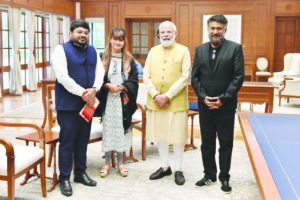By RatanBhattacharjee
Italian film director Bernardo Bertolucci once said, “I am no longer interested in making political films. There is something old-fashioned about them. Now young people don’t care for politics.” Young people may not care for Vivek Ranjan Agnihotri’s film, The Kashmir Files, but the Bharatiya Janata Party leaders are all mesmerised by the film for its political message. Even Prime Minister Narendra Modi gave a clarion call to his partymen to rally behind the film.
 Today there should be no doubt that it is a highly motivated political film with BJP leader Mithun Chakraborty playing a role in it. And the film is being used to rake up the Hindutva issue once again by Modi and his BJP comrades with an eye on the 2024 Lok Sabha elections after the recent victory in four states. So, each and every slogan in the film is facing big controversy. ‘Desh ke gaddaro ko, goli maro salo ko’ is one such slogan. It is not clear who the gaddars (traitors) are.
Today there should be no doubt that it is a highly motivated political film with BJP leader Mithun Chakraborty playing a role in it. And the film is being used to rake up the Hindutva issue once again by Modi and his BJP comrades with an eye on the 2024 Lok Sabha elections after the recent victory in four states. So, each and every slogan in the film is facing big controversy. ‘Desh ke gaddaro ko, goli maro salo ko’ is one such slogan. It is not clear who the gaddars (traitors) are.
Very few films have come out on Kashmir and the controversial issues in Kashmir. After the fervid anti-Covid campaign, this clarion call for supporting The Kashmir Files is the next serious campaign for “truth and freedom of expression” by Modi. Each and every thing about the film is motivated and anyone can read the subtext beneath the main show. It is not surprising that The Washington Post columnist, Rana Ayyub read the subtext and regarded the slogan as something against Indian Muslims in general even though there was no mention of the word Muslim or any religious identity. No need to blame Ayyub as even a common watcher of the film can guess the motif of the film for which the BJP is ready to campaign most strongly.
 It is a new film on the exodus of Hindus, specifically Kashmiri Pandits or KPs, from the Kashmir Valley in the 1990s which has kicked up a storm in India with the BJP weighing in on its behalf. Never before did a prime minister root for a movie. In the context of The Kashmir Files, even Modi who is otherwise is alleged to be against freedom of expression, tells BJP parliamentarians to “stand up for those bringing out the truth” in the film.
It is a new film on the exodus of Hindus, specifically Kashmiri Pandits or KPs, from the Kashmir Valley in the 1990s which has kicked up a storm in India with the BJP weighing in on its behalf. Never before did a prime minister root for a movie. In the context of The Kashmir Files, even Modi who is otherwise is alleged to be against freedom of expression, tells BJP parliamentarians to “stand up for those bringing out the truth” in the film.
The Kashmir Files, written and directed by Agnihotri and released on March 11, revolves around a university student who discovers his Kashmiri Hindu parents were killed by Islamist militants and not in an accident as his grandfather told him. Apart from Chakraborty, the film stars Anupam Kher, Darshan Kumar and Pallavi Joshi among others.
It is strongly objected that Indian Muslims are often equated with traitors. Even the slogan calling for the glory of Mother India (Bharat Mata ki jai) is poised against Muslims in the opinion of Ayyub. The film depicted the barbarism committed against the KPs in its crudest form and the victims are yet to receive justice even after three decades. The slogan is intended for the people responsible for this age-long torture on the Hindus and not for Indian Muslims. It is more specifically intended for the terrorists and enemies of India and they cannot be the common Indian Muslims.
But the political colour that the BJP as a party in the row is giving to it seems to have created all the confusion. With the BJP accused of stoking the Gujarat riots, this overenthusiastic justification of the film seems rather unusual and many are suspicious of the film’s tenor. A small-budget film with no big stars became a superhit in the first week of its release and triggered more polarised opinions than Padmavati released a few years ago. One big reason is the very name of Kashmir that is a controversial subject.
The movie delves into the history of Kashmir, a restive region along India’s border with Pakistan that has long been a sensitive subject.
The Muslim-majority valley has seen armed insurgency against Indian rule since the late 1980s. What is tragic is that the Kashmiri Hindus have been continuously targeted, especially the upper caste KPs who were a minority group. But this is never to include all the Muslims of Kashmir or India.
The BJP government revoked Kashmir’s constitutionally-guaranteed autonomy in 2019. The party used the conflicted region as a poll plank and took a great initiative to focus on the issue of the Hindu exodus.
Very few writers or film directors had earlier focused on the exodus before this film which was to be released before the Republic Day. It was postponed due to the Omicron wave before the assembly election campaign in five states kicked in.
Modi is taking a swipe at those who were against the release of The Kashmir Files by relating it to the issue of ‘freedom of expression’ while the country knows that his government has scant respect for the pluralistic ethos of India.
The global KP diaspora raised funds for the film and promoted it on Times Square, the world’s most expensive and prestigious advertising site.
We don’t know the consequences of making the issue of Kashmir genocide being mainstreamed but according to Agnihotri, this will make his country proud at the global level. People are watching the film but what they are more interested in watching how a film is made a political tool with even the Prime Minister into it.
Modi referred to the reluctance in presenting history and historical figures in the right perspectives as in the case of the delayed recognition of Mahatma Gandhi. He slammed the “ecosystem that is involved in burying the truths” and urged his party MPs to stand up for those who bring out “truths that have been suppressed for years”. But what is the truth behind all campaign for truth, no one knows yet.
(RatanBhattacharjee is a senior academician and multi-lingual columnist)



